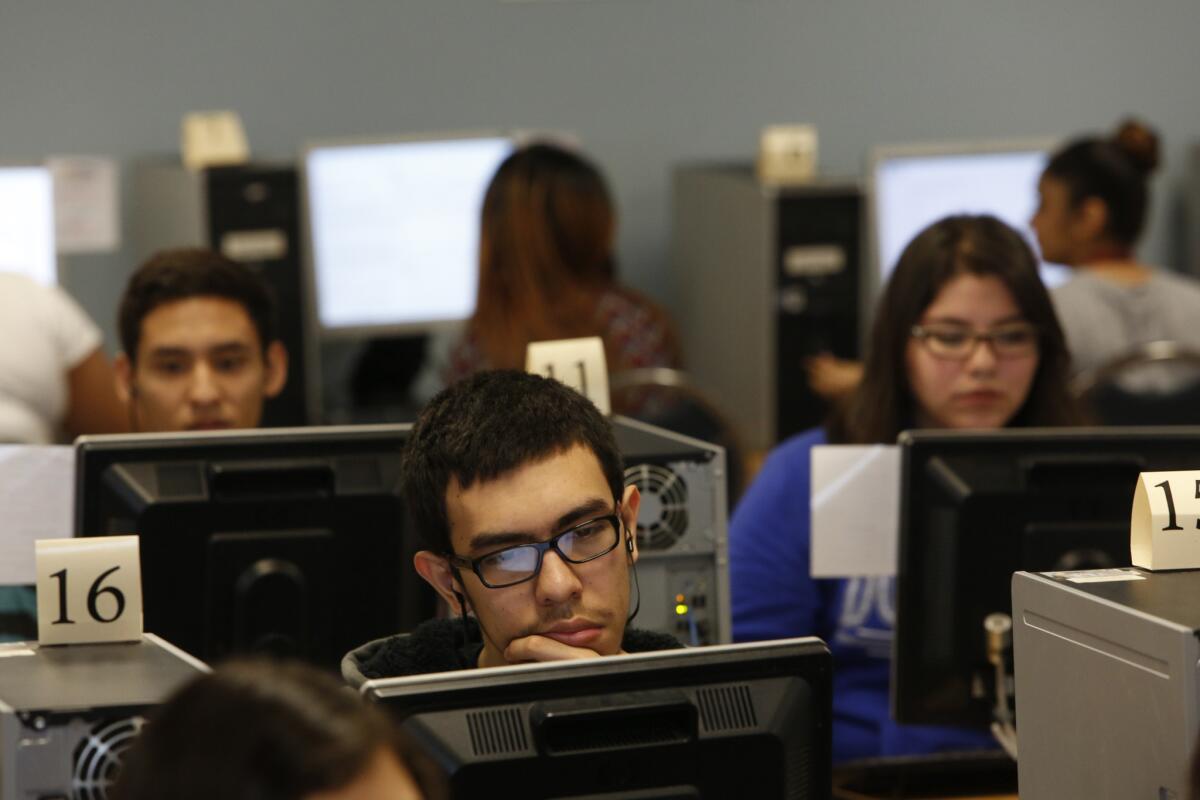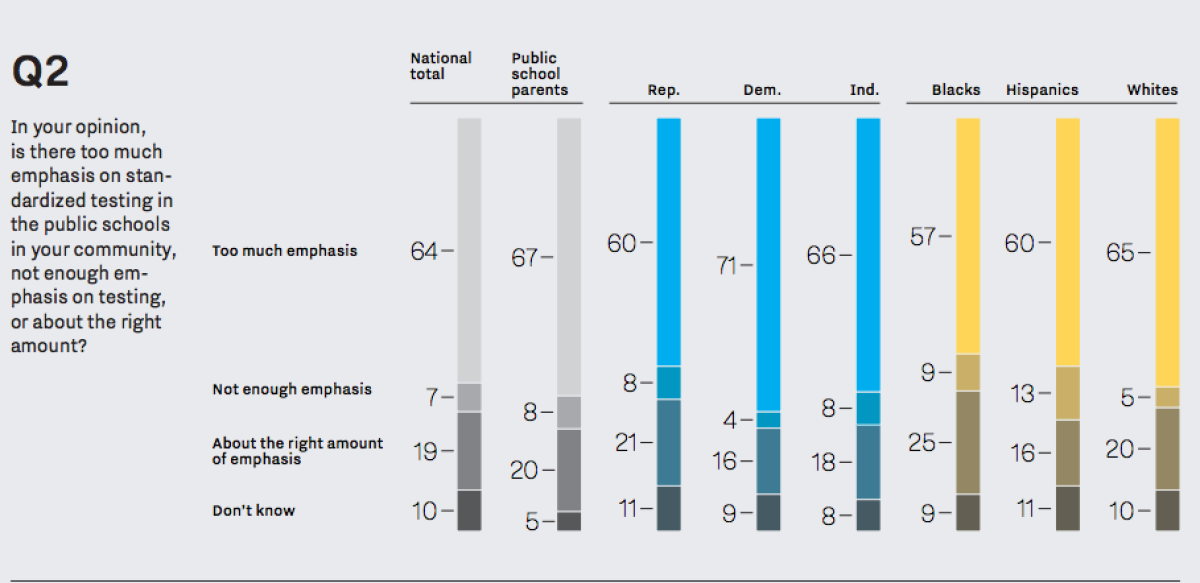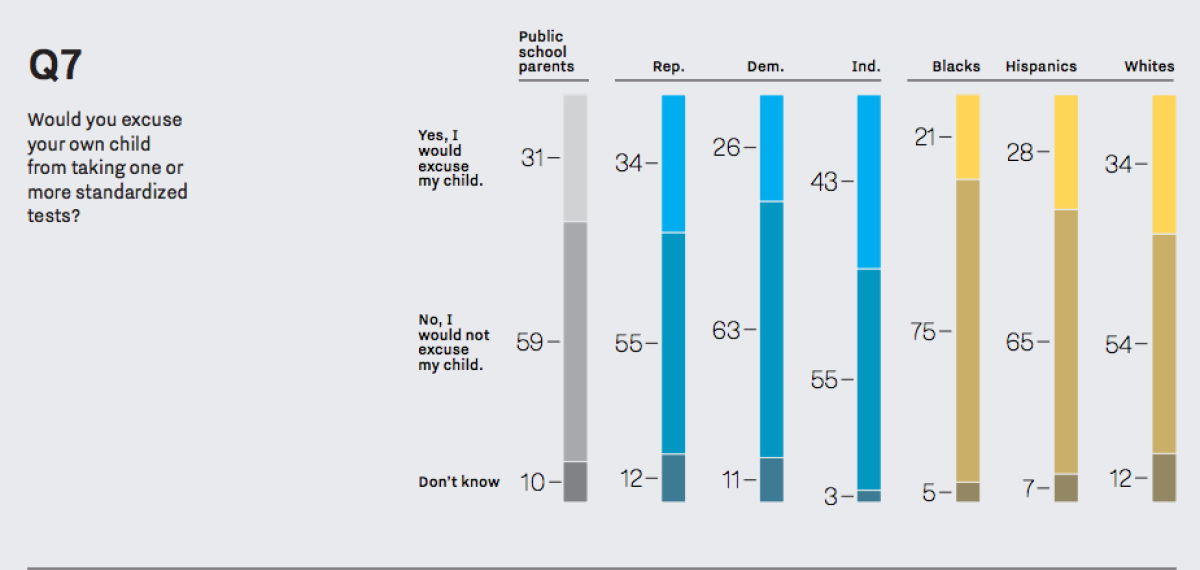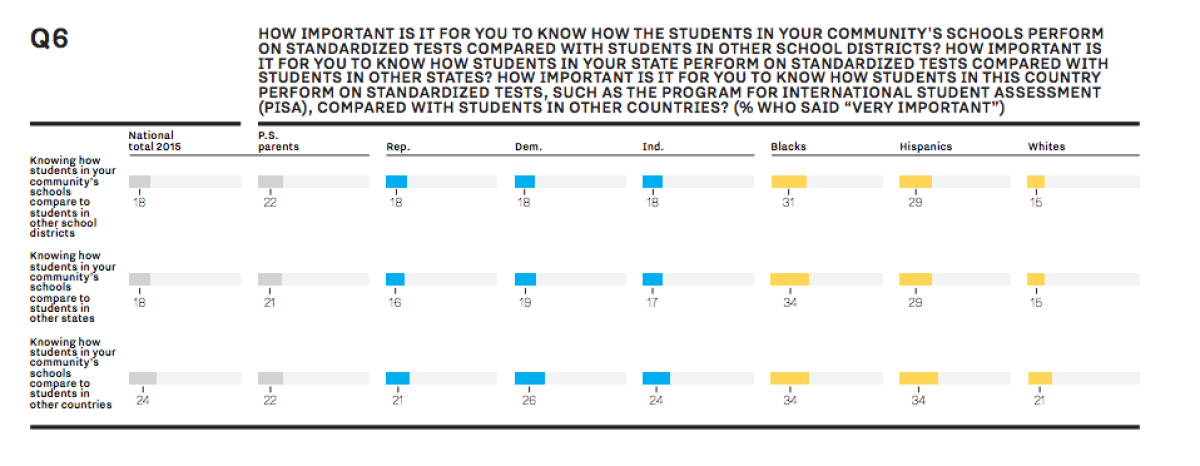Here’s what happens when you ask parents multiple-choice questions

Students at Francisco Bravo Senior High Medical Magnet School in February take a practice test for the new state standardized tests on laptops and desktop computers to measure their understanding of Common Core Standards in math and English.
- Share via
More white Americans dislike standardized testing than blacks and Latinos, according to a new poll.
Disdain for standardized testing is nothing new. But the poll released Sunday by Phi Delta Kappa and Gallup complicates this perception with its racial breakdown.
Overall, the results show that parents across California might not be at the edge of their seats to receive the delayed results of Common Core tests in September.
When asked whether public schools place too much emphasis on testing, 64% of the national total and 67% of public school parents said there was indeed too much emphasis. The poll surveyed 1,000 adults ages 18 and up and also included an online poll of 3,499 nationally representative adults that same age.

American adults indicated on the PDK/Gallup that there is too much emphasis on testing in schools.
While standardized testing has gotten a bad reputation, though, these aggregate numbers betray a more complex pattern: based on the survey, more white Americans dislike testing than black and Latino parents. Sixty-five% of white adults surveyed said there was too much testing, compared to 57% of blacks and 60% of Latinos. While only 5% of white Americans indicated there is not enough emphasis on testing, 9% of black adults and 13% of Latino adults expressed that same view.
The survey also asked parents whether they would excuse their own children from testing, a question prompted by the "opt-out" movement in which parents across the country have pulled their kids from testing. Similarly, while 31% of public school parents said yes, 34% of white parents said yes, compared to 21% of black parents and 28% of Latino parents.

Would parents excuse their children from taking standardized tests?
The survey also asked how important it is to be able to compare schools in respondents’ communities to schools in other districts, schools in other states and schools in other countries. The racial breakdowns were similar here:

Parents were asked about the importance of comparing test scores in their own community to those of other school districts, states and countries.
When Americans were asked about the most important factors in deciding on a school, over 90% of all groups surveyed ranked “quality of the teaching staff;” testing, naturally, ranked toward the bottom. It’s worth noting, though, that there is no clear, agreed-upon metric for rating teacher quality. The debate over this topic, and particularly whether to include testing in this measurement, has been raging for years.
Jesus Andrade, a Los Angeles father of two, would fall into the minority when it comes to how to rate schools. When searching for a school, he said, the test scores did matter. “I just looked at test scores,” he said, according to a page in the survey report that focuses on Andrade. “Since I live in South Central [LA], I don’t have a choice between a good school and the best school. I had a choice between the worst schools and a good education all around.”
Andrade said he had heard stories of parents worrying about socio-emotional learning and arts in their schools or sports programs. To him, that sounded luxurious. “Some people are fortunate to have choices like that,” he said. “They can select between a good school and the best school. Where I live in South Central, we don’t have that choice.”
His South Los Angeles neighbors, he said, felt similarly, and turned to charter schools as a result. “I want more kids to have the best education they can receive,” he said. “I’m more practical than ideological. The liberals and the conservatives, they have their positions. I just look at the proof of what’s happening.”
That said, he too has doubts about test scores, and as his sons get older, he is beginning to think about those other choices: He is considering moving his older son to a traditional public school so that he has access to more sports programming.
The phone survey had a margin of error of +/- 4.79 percentage points, and the Web survey had a margin of error of +/- 3.02 percentage points. For the online survey, the Latino population was surveyed with a margin of sampling error at +/-8.7 percentage points, and the black population was surveyed with a margin of sampling error at +/-7.9 percentage points.
You can reach Joy Resmovits on Twitter @Joy_Resmovits and by email at Joy.Resmovits@LATimes.com.
Sign up for Essential California
The most important California stories and recommendations in your inbox every morning.
You may occasionally receive promotional content from the Los Angeles Times.








